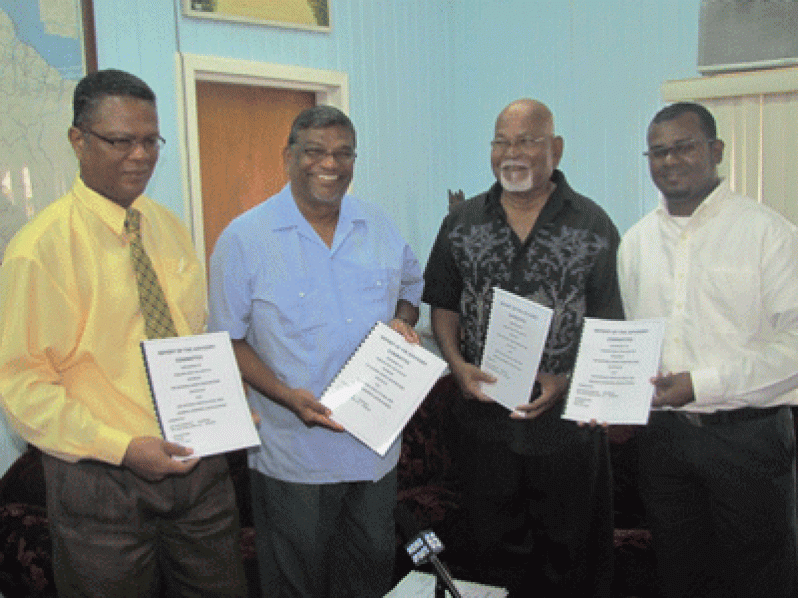– report presented to Dr Gopaul
A REPORT compiled by the Advisory Committee appointed by Minister of Labour Dr. Nanda Gopaul to look into the dispute between the Guyana Sugar Corporation (GuySuCo) and the Guyana Agricultural and General Workers’ Union (GAWU) was, on Thursday, handed over to the minister by Head of the Committee, Dr. Dale Bisnauth.  The committee was mandated to inquire into the dispute existing between GuySuCo and GAWU with particular reference to the circumstances which led to the strike at Blairmont estate on February 9, 2012 and the call by workers for the removal of the Estate and Agricultural Managers and to make recommendations.
The committee was mandated to inquire into the dispute existing between GuySuCo and GAWU with particular reference to the circumstances which led to the strike at Blairmont estate on February 9, 2012 and the call by workers for the removal of the Estate and Agricultural Managers and to make recommendations.
Others who served on the committee include Mr. Mohamed Akeel, former Chief Labour Officer (member); Mr. Neville Nichols, who performed the duties as secretary and Acting Chief Labour Officer, Mr. Charles Ogle.
Dr. Bisnauth said the committee met at Blairmont where the problems were and spoke to GuySuCo’s representatives and the workers. He noted that the investigation was conducted in a civil manner which indicated that problems could be resolved if the parties are prepared to sit and talk.
He explained that the workers were very articulate in representing their problems while the employers listened, sometimes to criticisms by the workers themselves.
Dr. Bisnauth said the main issue was that of ‘customs and practices’ and explained that these were points that might not have been written into any agreement, but had developed over the years and maintained by the workers.
The former labour Minister said the Committee discovered just how sacrosanct this has become in the management-labour relationships and gained status over the years, while not being written onto in any agreement.
He posited that the GuySuCo management would do well to recognise that fact which would minimise some of the other problems. Bisnauth also noted the fact that the workers had chosen to exhaust the process rather than to take action which is detrimental to the industry and therefore to themselves.
Minister Gopaul observed that the customs and practice issue is one that is faced on a routine basis in the industry where workers clamour for their maintenance. “I believe that while we must have changes in a more dynamic economic situation, you can’t have these changes without consulting with the workers and their representatives. To be arbitrary would be to the detriment of the industry ultimately,” the Labour Minister stated.
He said the ministry would urge GuySuCo’s management to have the issue discussed and ventilated with the workers, “though you may find something might be of financial benefit to the industry, you just can’t introduce these changes in a manner in which workers will be uncomfortable or feel that they have been bypassed,” the minister stated.
The conduct of good industrial relations is essentially based on dialogue, he added.
Minister Gopaul stated that the Chief Labour Officer has insisted that should workers proceed on strike action because they want to maintain customs and practice, he would take a tough position with the employers. The CLO will mandate GuySuCo management to go back to discussions with the union on any changes they wish to implement.
Meanwhile, Dr. Bisnauth expressed hope that the recommendations made by the committee will be taken on board. He stated that workers are no longer prepared to hear the excuse that “orders have come from the top”. Those orders need to be first discussed with workers.
Dr. Bisnauth pointed out that the workers are as interested in the sugar industry as management, being aware that if profits are not made in the industry then they stand to suffer as well.
Minister Gopaul pointed out that currently the sector is getting less ‘opportunity days’ for harvesting and for production purposes. “You no longer get 180 days per year to produce sugar …that is dropping considerably to 50 to 60 ‘good opportunity days’…and that is really a serious impediment to production at this point in time. We have to find new methods of doing things, and we have to discuss with the workers,” he declared.
The minister noted that the fundamental issue in industrial relations is the fact that each company that has a collective agreement with unions would have a procedure for settling disputes, and if that procedure is not observed from day one, industrial relations will be in trouble and the collective bargaining process will be compromised if both sides are not involved.
“If those procedures are observed, conflict can be reduced. In fact, they are designed in such a way to avoid conflict all together and that’s what collective bargaining is all about in a modern-day concept,” Minister Gopaul said.
Among the recommendations are: all customs and practices prior to strike action be reverted to and management and the union meet to discuss and agree on changes; appointment and posting of managers in any industry is the prerogative of the administration of the industry; accordingly, the committee, despite strenuous calls by the workers, would not so recommend but leave it to the administrators to decide on the basis of evidence outlined in the report; management and the union at the central level meet regularly to look at issues that may affect the smooth operations of the estate and that joint sessions be held with workers to brief them on the state of the industry and the need to process issues through the grievance procedure, rather than engage in unnecessary wildcat strikes and the grievance procedure must be seen to work and not be seen as a mere formality to be gone through.
Labour Ministry’s inquiry into Blairmont Estate strike completed
SHARE THIS ARTICLE :
Facebook
Twitter
WhatsApp



.jpg)








